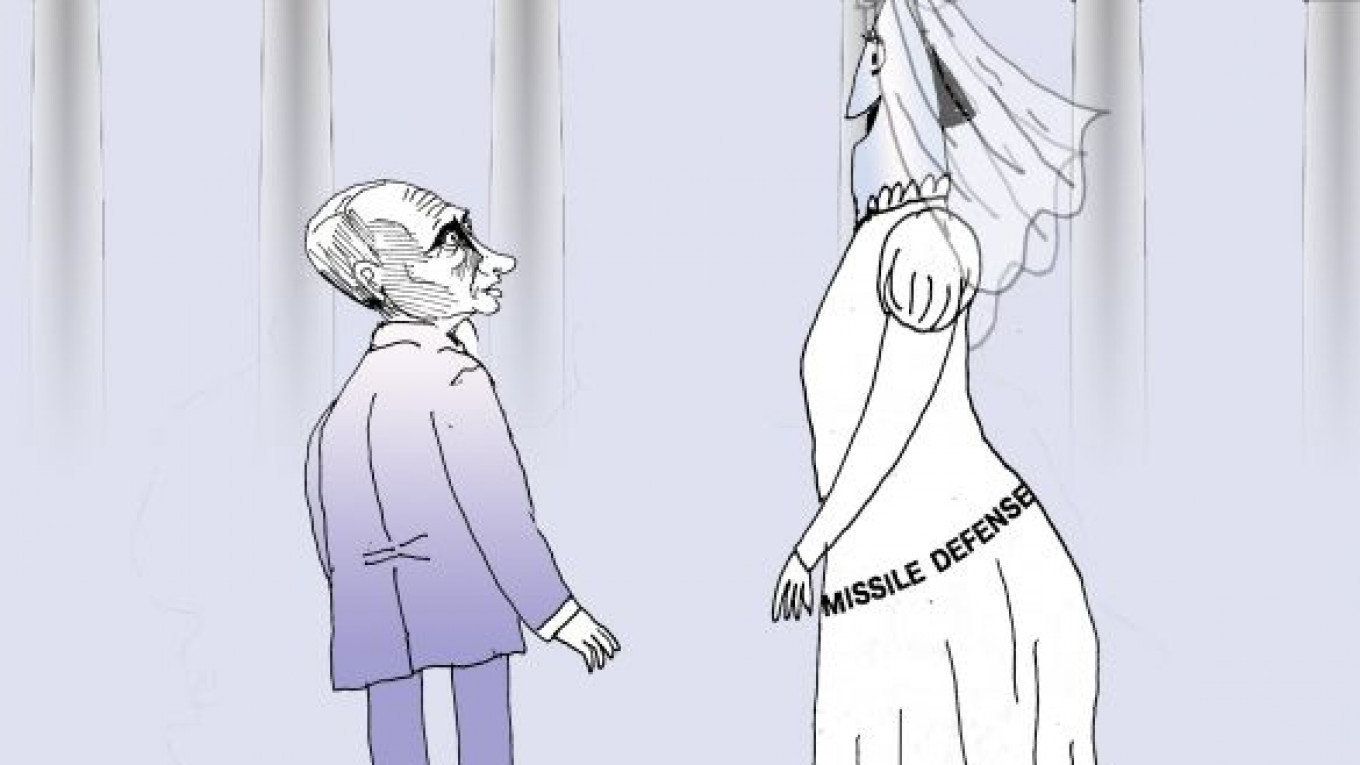During his campaign to return to the presidency, Vladimir Putin sharply criticized U.S. missile defense plans for Europe, claiming they pose a threat to Russia's strategic missiles. U.S. officials argue that Russia has no cause for concern. This difference has blocked an agreement between NATO and Russia on missile defense cooperation. To get out of this stalemate, the sides should consider a "trial marriage" in which they could test their compatibility before signing up for the long haul.
The United States intends to deploy missile defenses in Romania and Poland later this decade, as part of a plan approved by NATO leaders in November 2010. The Kremlin asserts that those defenses will threaten Russia's strategic missiles. Moscow thus has demanded a legal guarantee that U.S. missile defenses not be directed against Russia before it will engage in a cooperative missile defense arrangement with NATO.
Washington says its missile defenses will lack the range and velocity to reach Russian strategic missiles and that it is ready to allow Russian experts to observe U.S. missile interceptor tests to confirm this. Washington maintains, moreover, that day-to-day missile defense cooperation would deepen Russian understanding of U.S. capabilities and, in the process, reassure Moscow that they pose no threat to Russia.
A legal guarantee on missile defense would require Senate ratification — at least two-thirds of the votes. But this is all but a nonstarter, since it is unlikely that the Senate would ratify anything that even hints at constraints on missile defense.
The Russians, however, have an understandable point. They do not want to lock themselves into a missile defense arrangement with NATO that might someday develop capabilities against their own strategic missiles. There is a relationship between strategic offense and missile defense.
So how about a trial marriage?
Under such a deal, NATO and Russia would agree to provisional cooperation on missile defense for a fixed period — say, four years. NATO would acknowledge at the outset that Russia has strong concerns about U.S. missile defense capabilities and that Moscow's agreement to provisional cooperation with NATO in no way prevents Russia from deciding against making this cooperation permanent.
This arrangement would allow the sides to move past the current stalemate over a legal guarantee. They could put in place — on a provisional basis — practical elements of missile defense cooperation, where the views of both sides already converge on key points.
First, NATO and Russia could establish procedures for reciprocal transparency about missile defense systems and plans. This could include information on numbers and locations of missile defense components. It could also include information on the range and velocity of missile interceptors and procedures to allow the other side to observe tests. This would give Moscow better information on how to assess whether there is a risk to its missiles.
Second, the sides could work out a program of joint NATO-Russia missile defense exercises. They have carried out joint theater missile defense exercises in the past, so they have a foundation on which to build.
Third, NATO and Russia could establish two jointly manned centers. A data fusion center would combine early warning information provided by NATO and Russian radars and other sensors. The enhanced data would give both sides a better picture of the ballistic missile environment in Europe. The second center could explore how the sides might deepen their cooperation, if only on a provisional basis.
If U.S. officials are correct, this kind of transparency and day-to-day interaction would alleviate Russian concerns about a threat from U.S. missile defenses. If, however, the Russians remain concerned after four years, all bets would be off. They could stop the transparency exchanges, halt the exercises and shut the doors at the two joint centers. NATO would accept this possible outcome in advance.
Moreover, nothing in this arrangement would prevent the Russians from taking steps that President Dmitry Medvedev outlined in a statement in November, such as upgrading Russian air and space defenses and arming Russian missiles with advanced penetration aids to overcome missile defenses. The Kremlin fears that a threat to Russia's strategic missiles could develop in six or eight years — well past the four years of a provisional arrangement.
NATO should invite Moscow to attend a NATO-Russia meeting in Chicago during the annual NATO summit in May. At the meeting, the alliance should propose that the centerpiece be a provisional missile defense cooperation agreement that would last four years, unless both sides decided to extend it. Putin should consider this option. Moscow would lose nothing by agreeing to this because it could always walk away at any moment. But if things worked out, NATO and Russian missile defenders might decide to make it a lasting partnership.
Steven Pifer, a retired U.S. Foreign Service officer, directs the Arms Control Initiative at the Brookings Institution.
A Message from The Moscow Times:
Dear readers,
We are facing unprecedented challenges. Russia's Prosecutor General's Office has designated The Moscow Times as an "undesirable" organization, criminalizing our work and putting our staff at risk of prosecution. This follows our earlier unjust labeling as a "foreign agent."
These actions are direct attempts to silence independent journalism in Russia. The authorities claim our work "discredits the decisions of the Russian leadership." We see things differently: we strive to provide accurate, unbiased reporting on Russia.
We, the journalists of The Moscow Times, refuse to be silenced. But to continue our work, we need your help.
Your support, no matter how small, makes a world of difference. If you can, please support us monthly starting from just $2. It's quick to set up, and every contribution makes a significant impact.
By supporting The Moscow Times, you're defending open, independent journalism in the face of repression. Thank you for standing with us.
Remind me later.








